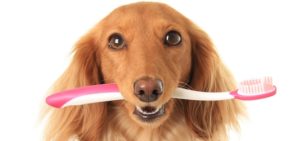National Pet Dental Health Month
 National Pet Dental Health Month is upon us. We just wrapped up celebrating Valentine’s Day, a day devoted to treats for all the loves in our lives, including our dogs and cats. So, I thought it would be only fitting to address a common misconception regarding dental health and pets. Many people think that dental health is not a priority for our pets. I’m here to tell you that is completely false. Dogs and cats are very susceptible to exhibiting signs of periodontal disease before they ever even make to the age of three. If not treated, periodontal disease can have serious long term effects. Proper dental care should be provided for your pets just as you would provide it for the human members of your family.
National Pet Dental Health Month is upon us. We just wrapped up celebrating Valentine’s Day, a day devoted to treats for all the loves in our lives, including our dogs and cats. So, I thought it would be only fitting to address a common misconception regarding dental health and pets. Many people think that dental health is not a priority for our pets. I’m here to tell you that is completely false. Dogs and cats are very susceptible to exhibiting signs of periodontal disease before they ever even make to the age of three. If not treated, periodontal disease can have serious long term effects. Proper dental care should be provided for your pets just as you would provide it for the human members of your family.
Know the Signs!
Knowing the signs of potential pet dental health is key! You should be very aware of what a healthy mouth should look like in your dog and cat. This will make spotting possible issues so much easier. Also, keep an eye out for some of the same signs of trouble as you would your human counterparts. Bad breath, broken, loose or extra teeth, bleeding and swelling of the mouth, and drooling can all be signs of periodontal disease. Furthermore, any indication that your pet is experiencing pain of the mouth or jaw, as well as refusal to eat as usual should be taken seriously. Any of the above signs can be a flashing red light that your pet’s mouth is not as healthy as it should be.
Think about Oral Hygiene every day!
Just as you brush your own teeth every day, you must also brush your pet’s teeth regularly. Starting out your pet on an oral hygiene regime of teeth brushing when he’s a puppy or kitten is ideal. However, it’s never too late to make your pet’s oral health a priority. Don’t give up if your pet seems reluctant to have you all up in his gums. After all, he’s an animal and won’t understand exactly what you are doing. Just as your pet grows accustomed to his coat being groomed, he can also get used to his teeth being brushed. If you’re not feeling confident, watch a few videos about to brush your pet’s teeth as well as ask your veterinarian for some tips and tricks.
Treats can Help!
Dental chews are a great way to aid in the teeth brushing process. Chewing on dental chews will mimic the action of your pet having his teeth brushed. Similarly, dry dog food should be part of your dog’s diet, unless he can eat for other health reasons. Dry dog food also will aid in keeping your dog’s teeth clean for the very same reason as the chews. The best part is that he’ll enjoy himself in the process, too!!
See your Pet’s Veterinarian Regularly!
Many people wait until trouble arises before taking their pet to the vet. While you certainly should take your pet to the vet when something is wrong, that’s not the only time you should go. You might think that is wasting money, but it’s not. In fact, it can potentially save you money in the long run.
Regularly scheduled well visits will give your vet the opportunity to examine your pet’s overall general health, which will include dental health. You might be surprised, but most dental disease will be found below the gum line, which can only be detected via x-rays. Your vet will thoroughly examine your pet’s mouth to determine if x-rays and cleaning are necessary.
Cleaning under anesthesia is the norm so don’t be alarmed if your vet suggests it. While anesthesia does come with some risk, the teeth cleaning process is easier on your pet and will reduce the likelihood of injury and stress to your pet. Regular brushing may delay or complete wipe out the need for cleaning under anesthesia so that’s another reason to stay on top of a daily dental hygiene regime.
Don’t Delay!
As pet parents, we want our dogs and cats to be happy, healthy and around for many years to come. Neglecting your pet’s dental health can result in an unhappy, unhealthy pet. It can also reduce your pet’s life span. Plaque, bad breath, infection, jaw injuries and life threatening illnesses are all a result of poor dental hygiene in pets.
National Pet Dental Health Month is a great time to spread the word with #PetDental about the importance of dental health for all pets. For more information, visit American Veterinary Medical Association.

Leave a Reply